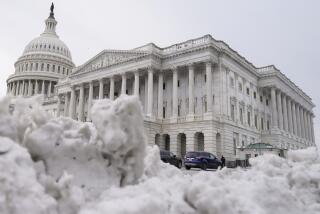Government is working again, sort of
- Share via
WASHINGTON — Yosemite National Park’s visitor centers were open. The barricades at the World War II memorial were down. And the Giant Panda Cam was back on.
Thousands of federal workers returned to their jobs Thursday after Congress passed and President Obama signed a measure to end the 16-day government shutdown.
The public was more than ready. “Within 10 minutes of turning the panda cam back on this morning, we reached capacity,” said Pamela Baker-Masson of the National Zoo.
But it will take more than unlocking doors and turning on lights before it’s business as usual again in the federal bureaucracy. Employees, who will receive their back pay, face a backlog of work.
That has stoked concern in the agricultural industry about whether the government can process visas fast enough to supply the workers needed to pick winter crops in Southern California and Arizona.
FULL COVERAGE: The U.S. government shutdown
The National Zoo delayed its reopening until Friday to give staff time to prepare for visitors, including restocking refrigerators with food to be sold to the public.
At the National Oceanic and Atmospheric Administration, six ships that had been ordered to their home ports will head back to sea, but it could take a few days before they are surveying fishing stocks and navigational dangers.
Employees may need time to return to their routines after “a period of time that has been emotionally draining,” said John Hudak, a fellow in governance studies at the Brookings Institution.
Some bosses made a special effort to welcome back federal workers.
Vice President Joe Biden dropped in at the Environmental Protection Agency with muffins. “I didn’t bring enough,” he said when he saw the long line.
Barbara Bruce, a 38-year EPA employee, was also furloughed in the shutdowns of 1995-96. “I think the last shutout I wasn’t that concerned,” she said. “But this one, I was a little worried because there was so much friction going on between the two parties. But I am happy that they resolved their problems, and I am truly glad to be back.”
As the formerly furloughed employees entered, they received a welcome-back note from EPA Administrator Gina McCarthy. “We have certainly missed you!” she wrote.
Interior Department employees received a similar memo: “We appreciate your sacrifices through these difficult times.”
QUIZ: Test your knowledge of the debt limit
Sally Katzen, who worked at the Office of Management and Budget during the last government shutdown, said, “There are inevitably some morale problems that have to be addressed on the return.”
At NASA’s Ames Research Center in Northern California, scientist Lee Stone dreaded the 16 days of work piled up on his desk.
Elsewhere in California, the Western Growers Assn. worried that the shutdown could delay the processing of visas for temporary foreign workers. “We’re concerned that we’re not going to have the workers when we need them,” said Jason Resnick, the group’s vice president and general counsel.
In Alaska, the worry was how long fishermen would have to wait for permits for the start of the Alaska king crab season, which was to have begun last Tuesday.
Julie Speegle, a spokeswoman for the National Marine Fisheries Service, said the agency was working as fast as it could to issue the permits. But Alaska and Pacific Northwest lawmakers sent letters to Commerce Secretary Penny Pritzker to nudge her to make the permits a priority.
“I’m very relieved, yes, that the government shutdown is finished,” said Mark Gleason, the head of Alaska Bering Sea Crabbers, a Seattle-based trade association. “But having said that, the permits still haven’t been issued. As a result, the fishermen are still sitting in port waiting.”
The National Park Service, which drew Republican criticism during the shutdown for barricading open-air monuments, particularly the World War II Memorial in Washington, wasted no time.
PHOTOS: 2013’s memorable political moments
Within a few hours after the bill to fund the government through Jan. 15 cleared Congress, the barriers to the memorial were down and Yosemite was open.
“There’s so many people who want to come to the park, we thought, let’s just get it open and welcome back people,” said Yosemite spokesman Scott Gediman. “It was pretty busy this morning.”
Michael A. Memoli in the Washington bureau contributed to this report.
More to Read
Sign up for Essential California
The most important California stories and recommendations in your inbox every morning.
You may occasionally receive promotional content from the Los Angeles Times.











